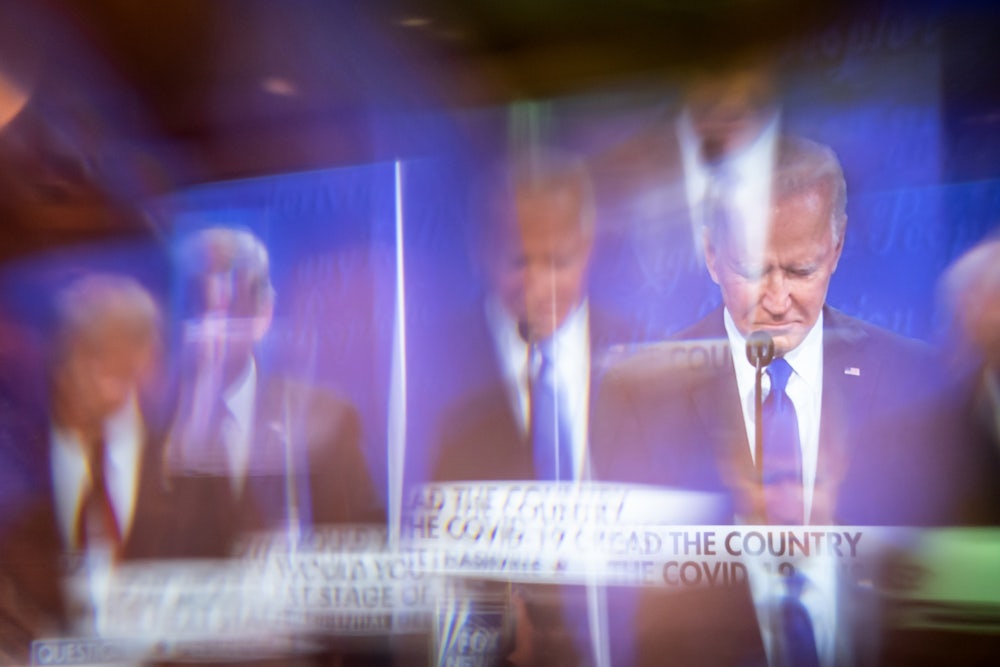I’ve always had trouble watching the countdown to Election Day. Even in a cycle that passes for normal, issues get reduced to talking points trotted out for their appeal to marginal polling demographics. Since the Electoral College robs us of one-person-one-vote fairness and hinges on the favors of undecided voters in swing states, candidates’ rhetoric and campaign promises descend into pandering to these small groups. And because they’re not seen as the key to winning Pennsylvania hearts, the most universally relevant and urgent matters that have ever come before us—the climate and extinction crises—are either trivialized or completely shelved. As though our children’s future doesn’t hang on our handling of these emergencies—right now, not down the road—by the thinnest of possible threads.
This year the stakes are so brutally high it feels like a sucking wound of anxiety, a whirling vortex of potentially chaotic outcomes. We’re forced to picture a scenario where the incumbent baselessly declares victory or refuses to concede, exhorting his angriest die-hard supporters to take to the street—some of them, doubtless, bearing arms, like Trump supporter Kyle Rittenhouse or Trump-supporting militia groups. Or the men who plotted to kidnap the governor of Michigan.
We’re forced to picture a scenario where the vote in a key state is suddenly, opaquely, hijacked by hacker minions of Vladimir Putin bent on retaining their useful idiot in the White House. Or where vote-counting rules and logistics keep us all in limbo for weeks, during which the incumbent, in a fit of vengeful petulance, hurls himself even further into a scorched-earth dismantling of our civil service apparatus purely for the satisfaction of saddling his successor with a grossly depopulated administrative state—or drags his cause before a newly hard-right Supreme Court, hand-picked to vote in favor of extreme forms of presidential authority.
All these scenarios, and more, flash before our dazzled and exhausted eyes. In the meantime a third wave of disease crashes over us, with almost a quarter-million dead—most of them needlessly—as the incumbent holds chanting, Nuremberg-like rallies crowded with unmasked admirers and barks out, against obvious evidence to the contrary, that we’re “rounding the turn.”
It’s hard to imagine a stronger argument for an executive shuffle in the Oval than the one presented by the past eight months of bungled pandemic response. But still, largely because of the separate information and propaganda silos into which our voters are now funneled, the competition in this presidential race has been tragically stiff.
That it has taken a grievously mismanaged, lethal contagion to sway voters just a few points away from the worst president in memory is itself a mind-blower. At times the cultish loyalty of Trump’s fan base has seemed to the rest of us like a miracle in reverse—a sinister magic that flies in the face of kindness and common sense.
Yet some observers say both sides refuse to see each other’s point of view—that both sides have locked themselves into their partisan convictions and thrown away the key. If only they’d just talk to each other.
But there’s a limit to therapeutic intervention as a means of bridging cultural schism. In this case, one “side” believes in science, including the hard-won knowledge and tireless work of doctors, and in civic duty—a responsibility to the collective. The other “side” scoffs loudly at the very idea of expertise and interprets “freedom” to mean “freedom to make others sick and possibly kill them because I don’t enjoy putting a cloth on my face.” It insists that the desires of individuals, those desires that harm others as well as the self, trump the good of the communities they live in. This is not a reasonable debate between parties with equally valid positions.
Radical individualist supremacy has dire implications far beyond Covid-19. If a large percentage of the American people refuse to take the simplest precautions to save lives in the face of a clear and present danger, what are the chances they’ll see the wisdom in reforming our economy and culture to protect abstract future generations from climate change—a threat that many of them barely believe exists? What are the chances they will politely agree, as past generations have (say, with food rationing during World War II), to curtail personal indulgences in the service of a greater goal? Close to zero.
We’re learning a lamentable but inescapable lesson from Covid anti-maskers: The United States is now a country that needs laws to discourage blatantly harmful anti-social behavior. Voluntary measures—willing sacrifices of pleasure and convenience—can’t be relied on. We’re no longer a people that believes, together, in the common good.
This is terribly sad. Sad, angering, and frightening. Anti-masking has shown us we can’t depend on our fellow citizens to uphold the tenets of basic decency.
So this election season has been like no other. For me and for many people I know, the anxiety is physical. We carry its tension in our shoulders and necks, toss and turn during sleepless nights. We know in our bones—maybe for the first time in our lives—that the results of this ugly contest will redound not only on us but down through the ranks of our descendants. That they’ll echo throughout the world, including the natural world whose services we depend on, profoundly and unavoidably, to survive.
Waiting for news anchors to call the first swing states of the night—especially when such calls may themselves be unreliable and chaos-inducing—has never felt so fraught.
